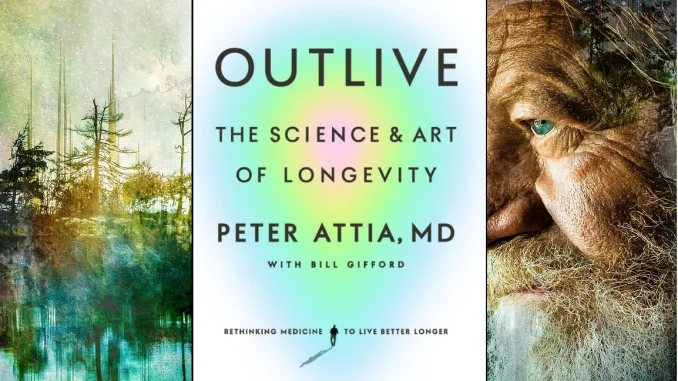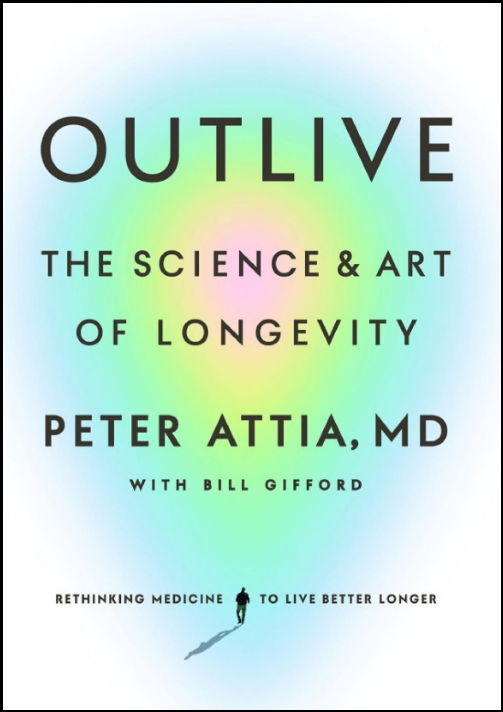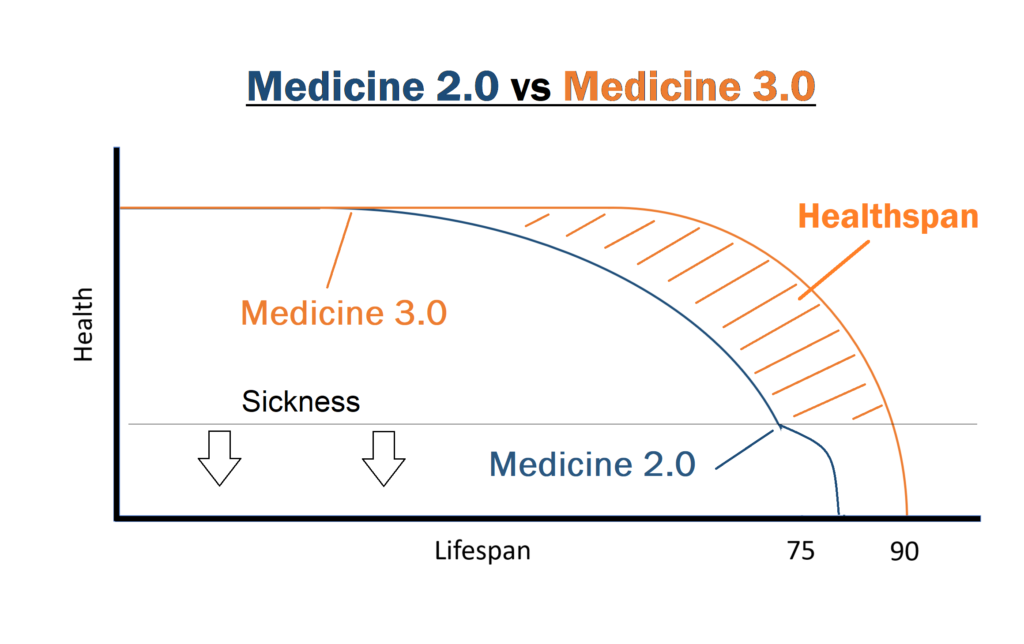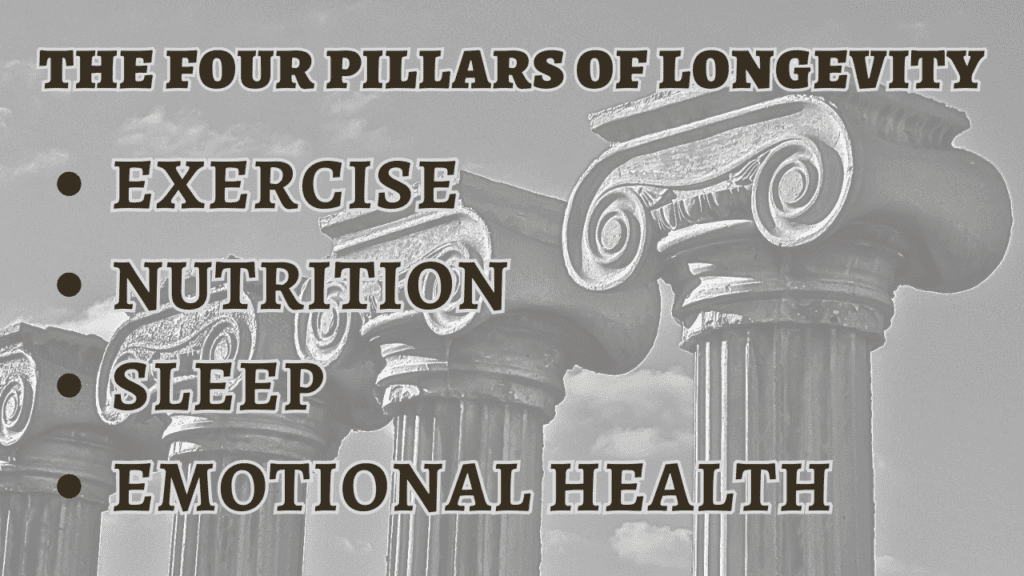
I confess that it was only a few months ago that I was first made aware of Peter Attia. I follow several health and longevity podcasts and someone recommended his, called The Drive. Since then I have listened to a dozen episodes and really appreciate his analytical approach to health.
His background is as a physician and more recently he established Early Medical, a practice operating out of Austin, Texas. He coined the term “Medicine 3.0” to differentiate the way he operates from most other practices. Rather than simply treating patients when they’re sick, he invests a lot of time and effort on the preventative side of medicine.
Medicine 3.0 is the main topic of this book and allows him to illustrate the difference between what’s currently practiced, and what’s optimal. He uses the term “slow deaths” to describe the diseases of ageing, like cancer and dementia. They’re slow because they involve a cumulative processes that take place across several decades of life – even if symptoms only show in the final years. For that reason we can take action much earlier than we think, intervening as early as our twenties to ensure a healthy retirement.
The final part of the book outlines the “four pillars” – exercise, nutrition, sleep and emotional health. These are the tools with which we can give ourselves the best chance of a long and healthy life. I found this to be an enlightening read, full of practical tips that can be implemented straight away to improve my health and well-being for years to come.

PRO TIP: Take notes! When you read a book, use a blank sheet of paper as a bookmark. Write down any interesting facts and information from the book. This condenses a whole book into 3-4 pages of key notes that are important and relevant to you.
My Notes on Outlive
Part I
- Longevity does not mean living forever, or even routinely reaching 150. The focus should be on increasing health-span, the years spent in good health, and not just lifespan. (Chapter 1)
The principles of medicine 3.0 are (Chapter 2):
- A focus on prevention rather than treatment
- Acknowledging that everyone is unique
- An acceptance that some interventions carry an inherent risk
- That it’s more valuable to improve health-span than lifespan
The “four horsemen” that are responsible for the majority of deaths are:
- Heart disease
- Cancer
- Neurodegenerative disease
- Metabolic dysfunction

Part II
- One of the most important longevity genes is APOE. Ideally you’d want a neuroprotective e2 allele and to avoid having one or two copies of the e4 allele. (Chapter 4)
- Caloric restriction (CR) in animal studies has extended lifespan by 15-45%, but the same may not be true for humans as there’s an increased risk of infection, injury and frailty. (Chapter 5)
The definition of metabolic dysfunction is meeting three of the following, though meeting any one of them is a bad sign (Chapter 6):
- High blood pressure (>130/85)
- High triglycerides (>150mg/dL)
- Low HDL Cholesterol (<40mg/dL in men, <50mg/dL in women)
- Central adiposity (waist > 40 inch in men, 35 inch in women)
- Elevated fasting glucose (>110 mg/dL)
- The canary in the coal mine for metabolic dysfunction is elevated insulin. He administers an Oral Glucose Tolerance Test but measures both glucose and insulin for the following two hours. (Chapter 6)
Total Cholesterol is only slightly more relevant to cardiovascular risk than eye colour
Peter Attia (Chapter 7)
- The level of Apolipoprotein B in your blood is far more relevant than total cholesterol (Chapter 7).
- Lipoprotein (a), referred to as Lp(a), is very dangerous in high levels. The level is largely genetic and some people can have up to 100 times the average so it’s worth testing once. (Chapter 7)
- Alzheimer’s disease is not reversible and can’t (yet) be treated once it starts. (Chapter 8)
- People who learn a new language or a musical instrument are more robust to cognitive decline as they have built up more of a “cognitive reserve”. (Chapter 9)

Part III
VO2max may be the single most important marker for longevity
Peter Attia (Chapter 11)
- Peter likes to use the concept of the “centenarian decathlon” with his patients. The idea is to start training now so that when you reach 100 years old you are capable of daily tasks. With the natural decline of ageing you need to be capable of doing much more at your current age. (Chapter 11)
- VO2max declines about 1% per year and 1.5% per year after the age of 50. (Chapter 12)
- For strength training and stability, Peter hosts tutorial videos on his website. (Chapter 13)
- Most people spend too long on “resumé virtues” and not enough on “eulogy virtues”. They might have a great CV but don’t consider what those closest to them might say at their funeral. (Chapter 17)
Longevity is meaningless if your life sucks
Peter Attia (Chapter 17)
If you listen to his podcast he covers a lot of the same material. I’ve heard him say Lp(a) “L P little A” enough times that I now read it in his voice. I thought it was a well constructed book that works as a great summary of what we need to do to stay in good health. For an additional resource, there is a digital program called Early which is launching in mid-2023. It allows someone a experience similar to what a patient goes through in his medical practice. More details are available here.

